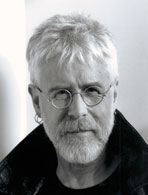![]()

|
Bruce Cockburnís Remarkable Teachers: Ruth Sutherland, Trudy Janowski and Elsie Beauchamp. |
|
Bruce Cockburn remembers his years in Broadview Public School in Ottawa with pleasure, easily recalling a number of teachers whom he admired and liked for the enjoyment they seemed to feel in being in the classroom and teaching children. Ruth Sutherland was his teacher in Grades 3 and 4. What stands out in his mind is not any particular subject she taught but the energy she brought to the classroom. "She inspired affection and enthusiasm for learning. She was excited about life," he says, and her engagement in what she was doing generated a zest for learning in her students. A later teacher he remembers with affection Ė and the only one he met again once he had become a successful musician Ė was Trudy Janowski, his French teacher in secondary school. "Mademoiselle Janowski was one of the best teachers I ever had," he remembers. "She treated us with respect and as if we were smart. That really made a difference." In those days, Cockburn feels, the education system expected students to learn and wanted them to learn. Students got a more complete education and "there seemed to be more room to learn and grow. I suspect itís not the same now." Cockburn later met Trudy Janowski again when he performed at the National Arts Centre in Ottawa. The former French teacher was by that time married to Hugh La Caine, the inventor of the first electronic synthesizer, and involved in Centre events. She reminded Cockburn of their past history. "She said she had always thought I would amount to something because of the suspicious way I looked at everything," he recalls. "I liked all of my public school teachers," Cockburn says, but adds that Elsie Beauchamp "scared me to death." Elsie Beauchamp (pronounced Beecham) taught Grade 5 at Broadview in 1955, when Cockburn was 10 years old. "She was a strict disciplinarian and I didnít appreciate the style," he recalls. He did appreciate her interest in history, which he shared. "Miss Beauchamp had a sense of the meaning of history. It wasnít just a collection of dates we had to learn. She had a passion for the events of history." Elsie Beauchamp also pushed Cockburn into auditioning for the school choir, although he didnít want to do it. During the tryouts, she and another teacher moved from student to student to listen closely to their singing voices. "I avoided getting chosen by pretending to sing really off key," he recalls. Today he thinks she was the first to introduce him to the idea of political activism. It was the McCarthy era and Cockburn remembers Elsie Beauchamp talking about singer and peace activist Pete Seeger. Seeger was forced to appear before the U.S. House Un-American Activities Committee at that time but refused to answer questions about his political views or name associates, arguing that it violated his First Amendment rights. Cockburn thinks that raising these issues in school was a courageous thing for a teacher to do. Red-baiting was not as rampant in Canada as it was in the United States, but the influence of McCarthyism was enough that activist sympathies were often viewed as a dangerous challenge to social peace and political stability. That wasnít the only discussion in Elsie Beauchampís class that stuck in Cockburnís mind. In connection with some news item about Turkish political turmoil, she asked her students if they knew what the term Ďradicalí meant. They didnít, of course, and she explained it to them. Cockburn canít remember the language she used so long ago but he does remember the sense of her explanation Ė that a radical is someone whose conscience requires that they not accept the status quo without question, and that they work to change things that arenít right. Cockburnís own social conscience and interest in world events began to surface in the late 1970s with Wondering Where the Lions Are and it motivated him to write some of his best-known songs, many of which appear on his newest album Anything Anytime Anywhere along with two new compositions. Cockburn went on to become closely linked with social causes such as environmental preservation and political activism around struggles for democratic freedoms in Latin America and Southern Africa. "I never felt there was a direct influence. But obviously it had some effect. Everything that happens to you at that time influences what you become and school is a big part of your life so it clearly affects what you do." If the seed was planted in those early years, what caused it to blossom years after he left university? There were three catalysts, one being the birth of his daughter. "Like everyone else, becoming a parent made me look around at the kind of world I had brought a child into." The second was travel Ė he began seeing what was happening in other parts of the world. The third was his brother Don Cockburnís involvement in the political upheaval in El Salvador. "My brother was always trying to get me interested in what was happening there and I became curious about what a revolution like that looked like up close since it didnít seem to be what I would have expected." Cockburn has heard from teachers in Ontario who now include his work Ė particularly the words to his songs Ė in the classroom. He finds it flattering but canít help feeling they should be studying someone like T. S. Eliot, he says.
|
|
From the Chair | Registrar's Report | Remarkable Teachers | Blue Pages News | Reviews | Calendar | Netwatch | FAQ | Letters to the Editor Ontario College of Teachers 121 Bloor Street East, 6th Floor Toronto ON M4W 3M5 Phone: 416-961-8800 Toll-free: 1-888-534-2222 Fax: 416-961-8822 http://www.oct.ca info@oct.ca |